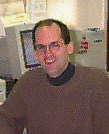
Steven W. McLaughlin
Assistant Professor
School of Electrical and Computer Engineering
Georgia Institute of Technology
Atlanta, GA 30332-0250
Tel: 404-894-6617
Fax: 404-894-0035
email: swm@ee.gatech.edu
Office: Room 571 GCATT Building (250 14th St.)
Steven W. McLaughlin received the B.S. degree from the Northwestern University in 1985, the M.S.E. degree from Princeton University in 1986, and the Ph.D. degree from the University of Michigan in 1992, all in electrical engineering. His doctoral research was in the area of source-channel coding with applications to high density magnetic recording channels. He has held positions at AT&T Bell Laboratories, Eastman Kodak Co., and Booz, Allen and Hamilton. From 1992-1996 he was on the faculty of the Electrical Engineering Department, Rochester Institute of Technology, most recently as an Associate Professor. He joined the School of ECE at Georgia Tech in September 1996.
He received the National Science Foundation CAREER award in 1997, an NSF Grant Opportunities for Aacademic Liason with Industry (GOALI) award in 1995 and the NSF Research Initiation Award in 1993. His work has also been supported by Optex Communications, General Electric, Harris Corporation, and Western Digital Corp. A list of some recent publications is here. He holds or has pending 22 US patents in the area of modulation codes for optical recording. He currently serves as the Publications Editor for the IEEE Transactions on Information Theory where he is responsible for the production, scheduling, budgeting, and final editing of the 200+ papers published yearly in the Transactions.
Professor McLaughlin’s research interests are in the area of communication and information theory, including source coding (quantization and compression), combined source-channel coding, and coding for constrained channels. Current projects include combined source-channel coding for speech, modulation codes for binary and nonbinary magnetic and optical recording channels, shaping for bandwidth efficient channels, blind equalization, and turbo codes.
Related links:
Number of visits since April 12, 1997:

